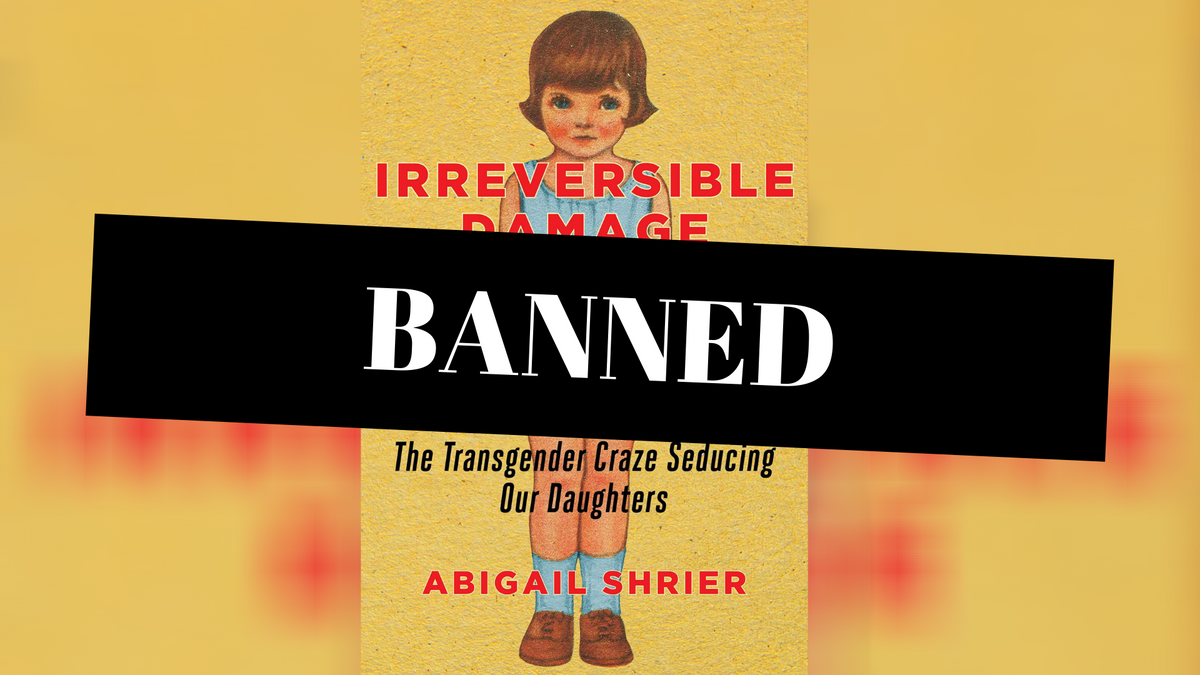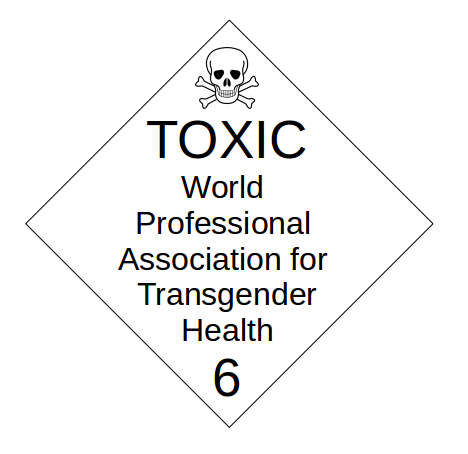The Massive Effort to Censor “Irreversible Damage” Shows the Trans Debate is Not About Reducing Harm
The response to Abigail Shrier's book reveals trans activists' true colors

If you really want to help a group of vulnerable, hurting, and struggling people, what do you do? Do you gather all the available research, data, and information to make informed policy and advocacy decisions? Or do you shut down, censor, and blacklist any research about why these people are hurting?
When it comes to the debate around the increasing number of teenage girls who are “transitioning” to live as boys, those who claim to care the most about this population are utterly failing them by refusing to engage with research on the topic. Instead, extreme trans activists are attempting to shut down research papers, get books banned, and are even calling for the burning of material they deem “transphobic” because it does not fit their narrative.
This has never been more clear than in the reception to Abigail Shrier’s book, Irreversible Damage: The Transgender Craze Seducing Our Daughters.
Irreversible Damage is a deep dive into a rising trend in the LGBT community. Adolescent girls are increasingly spending time online, and then coming out as “transgender”. The identity often involves a social transition, such as changing names, hair cuts, and attire. But, more concerningly, trans-identifying girls are pushed down a path of lifetime medicalization including dangerous breast-binding practices, untested cross-sex hormones, and life-altering surgeries. The trend is spreading rapidly among peer groups, leading Dr. Lisa Littman to describe the pattern in her seminal paper on the topic as a social contagion she termed “Rapid Onset Gender Dysphoria” (ROGD).
Abigail Shrier, a journalist for the Wall Street Journal and former law clerk, says she became interested in the subject when a distraught mother approached her, desperately seeking anyone in the mainstream media who would report on the rising trend which had impacted her own daughter. Shrier says she asked around, trying to find another journalist to cover the topic. No one would. Realizing that the culture of silence on the issue was covering up something massive, she took the plunge herself.
The book is not a feminist critique of gender identity. As Shrier readily says herself, she does think some people are really transgender and that adults should be able to make whatever decisions they like about their bodies. Rather, the book is entirely focused on exploring Littman’s theory of ROGD among teenage girls. These girls, she claims, are the same girls who in a previous generation were falling prey to another dangerous social contagion: anorexia and bulimia. The difference, though, is that this generation of parents, psychologists, school officials, and even doctors are encouraging the disorder—sometimes to irreversible medical extremes.
Irreversible Damage explores how girls, often experiencing what could be described as teenage angst or mental issues related to self-harm and depression end up “being treated” with double mastectomies and testosterone injections. It also explores how these “solutions” are often anything but, recounting story after story of girls who grew up only to realize they had been allowed by adults they trusted to do terrible and irreversible damage to their bodies at the age of 16.
If LGBT and human rights organizations truly cared about trans-identifying people, this book should have been full of useful information for them. Even if you disagree with the book’s analysis or conclusions, the rising numbers of “detransitioners”, girls who grow up to regret and reverse their transition, demonstrates that something is amiss.
Instead, trans activists have gone to extreme lengths to attempt to silence Shrier and wipe the book off the face of the planet.
Shrier’s first publisher backed out on publishing the book after staff complaints. Then, Amazon refused to allow her new publisher to sponsor ads for the book. “Amazon allows sponsored ads for books that uncritically celebrate medical transition for teenagers,” Shrier pointed out in an Op-Ed for The Post Gazette.
No major outlet would review the book—not even Kirkus Reviews, the largest book reviewing magazine which reviews over 10,000 works a year, including self-published titles.
When Shrier joined Joe Rogan for a podcast about the book, Spotify employees threatened to strike and demanded the episode be removed from the streaming platform.
Retail giant Target temporarily pulled the book from its shelves in response to two complaints on Twitter. They later reversed the decision after widespread backlash.
A GoFundMe page created independently by a concerned parent to raise money for a billboard promoting the book was pulled by the crowdfunding site, citing, “intolerance of any kind relating to ... sexual orientation, sex, gender, gender identity, gender expression.”
In November, an English professor at the University of California, Berkeley, Dr. Grace Lavery, called for burning the book on Twitter. According to the United States Holocaust Memorial Museum, burning books is a often associated with totalitarian regimes—most famously, Nazi Germany. Nazi book burnings were also organized by students and professors. It may be notable that Shrier herself is Jewish, as is Dr. Littman, who faced similar attempts at censorship for her research.
Around the same time, Chase Strangio, a trans-identified female and lawyer with the American Civil Liberties Union (ACLU), stated on Twitter that, “Stopping the circulation of this book and these ideas is 100% a hill I will die on.” Although Strangio was not speaking in any official capacity on behalf of the ACLU, the tweet is in direct contradiction to the mission of the organization which has long defended free speech. According to journalist Glenn Greenwald, this represents a cultural shift at the ACLU away from defending universal freedom of speech to a more “nuanced” approach. He may be right. Despite their history of defending the right to free speech for even the most repellent of groups such as the KKK and American Nazis, the ACLU has recently been on the front-lines of requiring compelled speech in “gender identity” cases such as Hecox v. Little in Idaho.
The lengths that extreme trans activists will go to in an attempt to silence Shrier and her book proves that gender ideologues do not actually have the best interest of trans-identifying girls at heart. Instead of grappling with the concerns she raises, they shout it down as “hateful” and “harmful” so they can avoid answering for the harm they themselves are causing.
Shrier is the first to say, though, that she is not the victim here. Her book is selling just fine, perhaps thanks to the Streisand Effect—the tendency for attempts at censorship to actually raise the profile of the controversial material. Rather, the real victims are the public who are being gaslit into believing that they are “bigots” for questioning what is happening to our young girls.
Irreversible Damage is full of heart wrenching stories of pain, girls struggling to fit in or find their place in the world, homophobia, families torn apart, and girls devastated by regret. Desmond, one girl Shrier interviewed, was on testosterone for years. When the hormones eventually left her in unbearable pain from uterine atrophy, she was pressured by doctors to get a hysterectomy. “When she awakened without a uterus,” writes Shrier, “she realized her entire gender journey had been a terrible mistake.”
“Many detransitioning young women have since come to believe they were just young lesbians who had internalized homophobia and been led to believe that not being typically feminine meant they weren’t female at all. Nearly all of them struggled with mental health and engaged in self harm.”
What are trans activists, who claim to be out to protect trans kids from the “harms” of a dangerous book, doing for girls like Desmond?
The reality is that detransitioners who speak up about their experiences receive no support from the trans community. In fact, they often actually become targets of harassment by trans activists online.
If trans activists really wanted to reduce harm in the lives of trans-identified teens, they wouldn’t be trying to burn this book. They would be engaging with the hard truths it raises, listening to the stories of the girls and families who regret being pushed down an irreversible path of medical transition, and start trying to change the culture within their own community that creates these patterns in the first place.
But they’re not. And that tells us everything we need to know about who really has trans teens’ best interest at heart.
Do you want to bring the "gender madness" to an end? Help us write about it! 4W is able to pay our all-female staff and writers thanks to the generous support of our paid monthly subscribers.
Enter your email below to sign in or become a 4W member and join the conversation.
(Already did this? Try refreshing the page!)




Comments